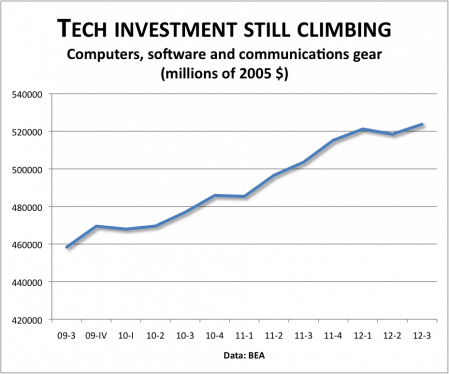INTRODUCTION
We live in a world where ‘data-driven economic activities’—the production, distribution and use of digital information of all types—are the leading edge of economic growth. Mobile broadband, increasingly available even in poor countries, is fostering a fundamental technological and social transformation. Big data—the storage, manipulation, and analysis of huge data sets—is changing the way that businesses and governments make decisions. And torrents of data ceaselessly flow back and forth across national borders, keeping the global economy linked.
Yet paradoxically, economic and regulatory policymakers around the world are not getting the data they need to understand the importance of data for the economy. Consider this: The Bureau of Economic Analysis, the U.S. agency which estimates economic growth, will tell you how much Americans increased their consumption of jewelry and watches in 2011, but offers no information about the growing use of mobile apps or online tax preparation programs. Eurostat, the European statistical agency, reports how much European businesses invested in buildings and equipment in 2010, but not how much those same businesses spent on consumer or business databases. And the World Trade Organization publishes figures on the flow of clothing from Asia to the United States, but no official agency tracks the very valuable flow of data back and forth across the Pacific.
The problem is that data-driven economic activities do not fit naturally into the traditional economic categories. Since the modern concept of economic growth was developed in the 1930s, economists have been systematically trained to think of the economy is being divided into two big categories: ‘Goods’ and ‘services’.
Goods are physical commodities, like clothes and steel beams, while services include everything else from healthcare to accounting to haircuts to restaurants. Goods are tangible and can be easily stored for future use, while services are intangible, and cannot be stockpiled for future use. In theory, a statistician could estimate the output of a country by counting the number of cars and the bushels of corns coming out of the country’s factories and farms, and by watching workers in the service sector and counting the number of haircuts performed and the number of meals served.
But data is neither a good or service. Data is intangible, like a service, but can easily be stored and delivered far from its original production point, like a good. What’s more, the statistical techniques that have been traditionally used to track goods and services don’t work well for data-driven economic activities. The implication is that the key statistics watched by policymakers—economic growth, consumption, investment, and trade—dramatically understate the importance of data for the economy. In turn, these misleading statistics distort government policy.
SUMMARY
In this policy brief we will show that government economic statistics, stuck in the 20th century, are missing most of the data boom. To remedy this problem, it is time to expand our economic statistics to add data as a primary economic category, just like goods and services. Until we do this, policymakers and regulators won’t have the information they need to make good decisions.
This policy brief is organized around three major arguments:
- We explain why data is becoming important enough to get its own statistical category. Individuals can consume data, just like they can consume soda (a good) or haircuts (a service). Businesses can invest in databases, just like they invest in buildings and equipment. And countries can export and import data, just like they export and import goods and services. As a result, instead of breaking down the economy into goods and services, statisticians need to be thinking about goods, services, and data. Adding data as a primary economic category can give policymakers a much more accurate picture of economic growth, consumption, investment, employment, and trade.
- We show how the official economic statistics dramatically undercount the growth of data-driven activities. To give a real-life example, we focus on the consumption of data by Americans. According to statistics from the Bureau of Economic Analysis, real consumption of ‘internet access’ has been falling since the second quarter of 2011.
- In other words, according to official U.S. government figures, consumer access to the Internet—including mobile—has been a drag on economic growth for the past year and a half. This is simply absurd. As a result, the official statistics are missing such important trends as the increasing adoption of smartphones and tablets, the growth of mobile broadband, and the enormous surge of usage of services like Gmail, Dropbox, Facebook, and Twitter.
- We adjust the official U.S. statistics to account for unmeasured data consumption by individuals. Based on our estimates, we show that real GDP rose at a 2.3% rate in the first half of 2012, compared to the 1.7% official rate. In other words, the impact of the data-driven economy on overall economic growth is being substantially underestimated. Based on these figures, the growth in data consumption in the United States accounts for roughly one-quarter of adjusted GDP growth in the first half of 2012, making data consumption by individuals is one of the largest contributors to U.S. economic growth in this period.
- We assess the link between economic growth and future government privacy and data regulatory policy in the 21st century data-driven economy Given that we have shown that data powers growth, correctly measured, we discuss the possibility that excessive privacy and data regulation can inadvertently harm future growth prospects.
To put it another way, restrictive and prescriptive regulation of the Internet and the movement and uses of data could have the effect not only of constraining Internet freedom but also Internet free trade. Such regulation could become the trade barriers of the data-driven economy, “balkanizing” access to information and innovative data-driven products and services and constraining global economic growth. That’s a highly undesirable outcome for everyone.
Download the memo.
Photo credit: Shutterstock/photobank.kiev.ua




